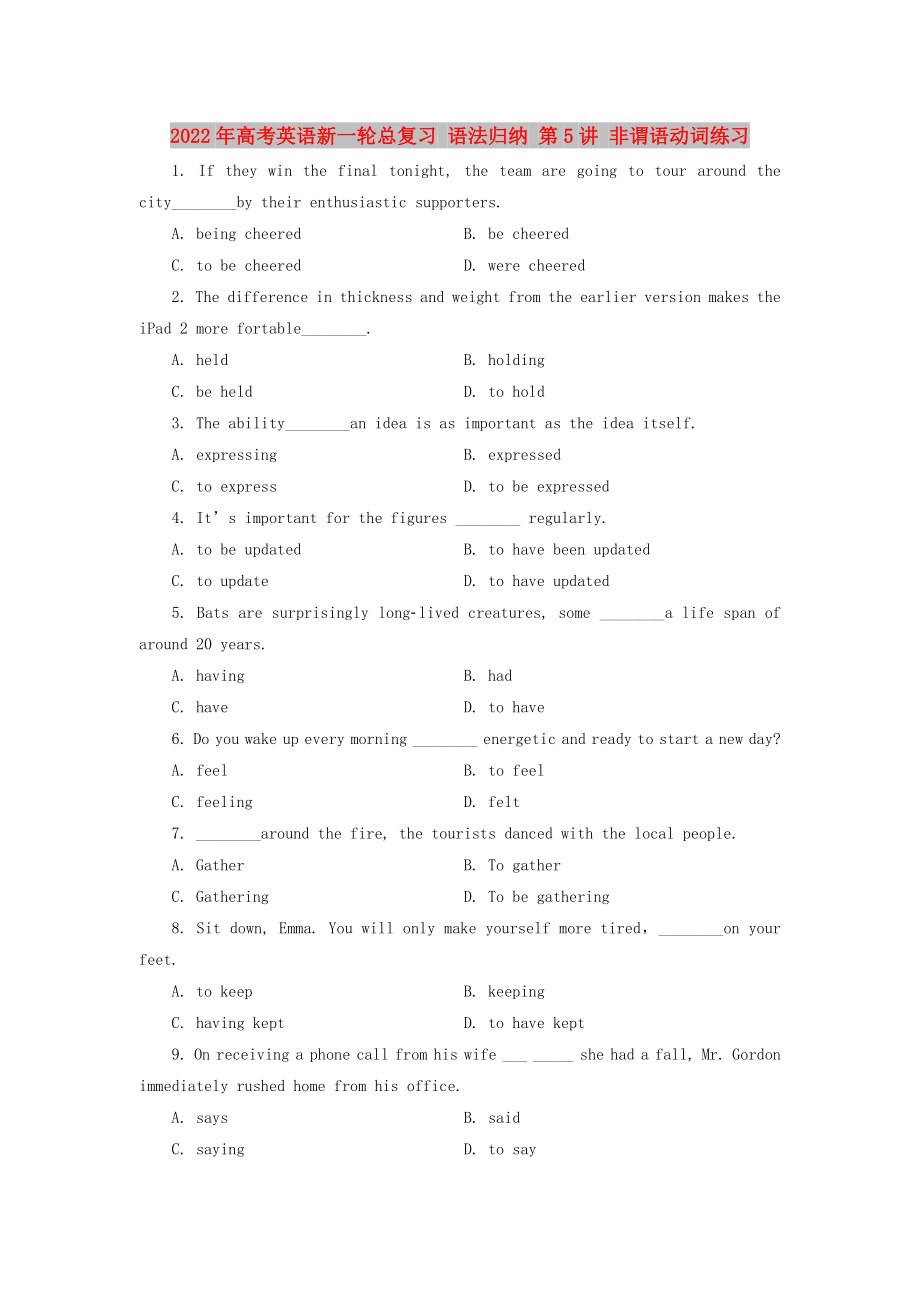《2022年高考英語(yǔ)新一輪總復(fù)習(xí) 語(yǔ)法歸納 第5講 非謂語(yǔ)動(dòng)詞練習(xí)》由會(huì)員分享��,可在線閱讀�����,更多相關(guān)《2022年高考英語(yǔ)新一輪總復(fù)習(xí) 語(yǔ)法歸納 第5講 非謂語(yǔ)動(dòng)詞練習(xí)(4頁(yè)珍藏版)》請(qǐng)?jiān)谘b配圖網(wǎng)上搜索�。
1、2022年高考英語(yǔ)新一輪總復(fù)習(xí) 語(yǔ)法歸納 第5講 非謂語(yǔ)動(dòng)詞練習(xí)
1. If they win the final tonight, the team are going to tour around the city________by their enthusiastic supporters.
A. being cheered B. be cheered
C. to be cheered D. were cheered
2. The difference in thickness and weight from the earlier version makes t
2�����、he iPad 2 more fortable________.
A. held B. holding
C. be held D. to hold
3. The ability________an idea is as important as the idea itself.
A. expressing B. expressed
C. to express D. to be expressed
4. It’s important for the figures ________ regularly.
A. to be updated B. to have b
3、een updated
C. to update D. to have updated
5. Bats are surprisingly long-lived creatures, some ________a life span of around 20 years.
A. having B. had
C. have D. to have
6. Do you wake up every morning ________ energetic and ready to start a new day?
A. feel B. to feel
C. feeling
4��、D. felt
7. ________around the fire, the tourists danced with the local people.
A. Gather B. To gather
C. Gathering D. To be gathering
8. Sit down, Emma. You will only make yourself more tired��,________on your feet.
A. to keep B. keeping
C. having kept D. to have kept
9. On receiving a
5�����、phone call from his wife ___ _____ she had a fall, Mr. Gordon immediately rushed home from his office.
A. says B. said
C. saying D. to say
10. Micheal put up a picture of Yao Ming beside the bed to keep himself________of his own dreams.
A. reminding B. to remind
C. reminded D. remind
答
6�����、案:
1. C 句意:如果他們今晚贏了決賽的話�,這支隊(duì)伍將在這所城市和熱情的支持者一起游行,歡慶勝利���。主句謂語(yǔ)為are going to,所以不能選擇謂語(yǔ)形式�����,排除B���、D兩項(xiàng)�;being done表示正在被……;to be done表示將來(lái)被……����。故選C項(xiàng)。
2. D 某些形容詞后面的不定式常用主動(dòng)形式表示被動(dòng)意義����,這些形容詞有: easy;hard����;difficult;fortable; heavy; light; nice等���。make后面的部分可改為:the iPad2 is more fortable to hold����。句意:厚度和重量與以前版本的不同使得蘋果iPad2握起來(lái)更加舒服�����。
7����、故選D項(xiàng)����。
3. C 不定式做定語(yǔ)��,修飾ability���。ability to do sth.����,是慣用法�����,意思為做某事的能力���。句意:表達(dá)一個(gè)想法的能力和一個(gè)想法本身同等重要��。
4. A the figures與update之間為被動(dòng)關(guān)系����,故用不定式的被動(dòng)式�����。句意:“定期地更新數(shù)據(jù)是很重要的�。”故選A項(xiàng)���。
5. A 第一句話是一個(gè)完整的句子��,由于其后沒(méi)有連詞���,我們可以斷定后面部分為狀語(yǔ)。some相當(dāng)于some bats��,與have構(gòu)成主動(dòng)關(guān)系����,因此須用some having...的形式作狀語(yǔ)。句意:蝙蝠是極其長(zhǎng)壽的生物��,有些壽命長(zhǎng)達(dá)20年���。故選A項(xiàng)����。
6. C 表示與wake up同時(shí)發(fā)生
8、的動(dòng)作�,且與邏輯主語(yǔ)you構(gòu)成主動(dòng)關(guān)系,故應(yīng)該用動(dòng)詞的現(xiàn)在分詞來(lái)作伴隨狀語(yǔ)�。句意:你每天早晨醒來(lái)時(shí)都感覺(jué)精力充沛并準(zhǔn)備好開(kāi)始新的一天嗎?故選C項(xiàng)�����。
7. C 兩個(gè)句子之間有逗號(hào)隔開(kāi)時(shí)����,它們之間存在下列幾種情況:(1)兩個(gè)句子之間有并列連詞;(2)兩個(gè)句子之間有從屬連詞�����;(3)兩個(gè)句子之間無(wú)連詞��,其中一個(gè)句子用非謂語(yǔ)動(dòng)詞的形式來(lái)表達(dá)��。此題屬于第三種情況�����,兩個(gè)句子之間無(wú)連詞但主語(yǔ)一致�,其中一個(gè)用分詞的形式來(lái)表達(dá)����,作狀語(yǔ)����。句意:聚攏在篝火邊�����,游客們和當(dāng)?shù)厝艘黄鹛鹆宋?�。故選C項(xiàng)���。
8. B 一直站著��,用來(lái)說(shuō)明主語(yǔ)you的狀態(tài)�����,與you構(gòu)成主謂關(guān)系����,作伴隨狀語(yǔ)����,應(yīng)用現(xiàn)在分詞�����。句意:“坐下�����,愛(ài)瑪���,一
9、直站著�����,只會(huì)使你更加累����。”故選B項(xiàng)�����。
9. C 句意:妻子打來(lái)電話說(shuō)自己摔倒了����,聽(tīng)到這個(gè)消息戈登先生立刻沖出他的辦公室向家里奔去����。分析句子結(jié)構(gòu)可知���,a phone call和動(dòng)詞“say”之間為主動(dòng)關(guān)系,所以用動(dòng)詞的現(xiàn)在分詞形式��,答案為C項(xiàng)�����。若將兩部分之間加連詞so或and�,則say在句中作謂語(yǔ),且時(shí)態(tài)為過(guò)去時(shí)��,可以選擇B項(xiàng)��。
10. C 句意:邁克爾在床邊掛了一張姚明的照片以提醒他自己自己的夢(mèng)想是什么�。分析句子結(jié)構(gòu)可知,所填部分在句中作賓語(yǔ)補(bǔ)足語(yǔ)���,且remind與himself之間是動(dòng)賓關(guān)系��,所以用過(guò)去分詞作賓語(yǔ)補(bǔ)足語(yǔ)�。故選C項(xiàng)。
名校模擬演練
1. [浙江溫州第一次適應(yīng)性測(cè)試]My
10��、 little brother is like a bull in a china shop, always________things over.
A. knocks B. knocking
C. to knock D. having knocked
2. [北京東城]________Joseph off at the airport, Sally finished her work earlier.
A. Having seen B. Seen
C. To see D. To be seen
3. [江蘇南京一模]________with a gradual r
11����、ise of seawater, some nations in the Pacific are considering moving in the near future.
A. Facing B. To face
C. Faced D. Being faced
4. [陜西寶雞質(zhì)檢一]A terrible air crash happened over the Atlantic Ocean,________150 passengers.
A. killing B. having killed
C. killed D. to kill
5. [上海春招]The b
12����、anker was found in a remote village after________his office last Thursday.
A. leave B. being left
C. leaving D. having been left
6. [北京西城]Mary, ________for her healthy lifestyle, was pictured on the front cover of Life Style magazine.
A. knowing B. to know
C. known D. being known
7. [安
13、徽合肥第一次質(zhì)檢]Barbara often makes a schedule to get herself________of what she is to do in the day.
A. remind B. to remind
C. reminded D. reminding
8. [山東煙臺(tái)調(diào)研]I wonder why Ann didn’t get________the job. She is the right person for it.
A. to be offered B. to offer
C. offering D. offered
9. [
14��、浙江溫州中學(xué)月考]________�, the student insists that he be separated from his deskmate, who is naughty.
A. To avoid being affected
B. To avoid to be affected
C. Avoiding being affected
D. Avoiding to be affected
10. [福建四地六校第一次聯(lián)考]The manager, ________it clear to us that he didn’t agree with us, left the
15、meeting room.
A. to make B. having made
C. made D. making
答案:
1. B 句意:我的小弟弟在一家瓷器店里就像一頭公牛��,經(jīng)常把東西撞倒�。根據(jù)語(yǔ)意此處應(yīng)用動(dòng)詞的現(xiàn)在分詞形式作結(jié)果狀語(yǔ)。
2. C 根據(jù)題干的后半句話可知����,前半句話表示目的,即莎莉早早地結(jié)束工作是為了到機(jī)場(chǎng)給約瑟夫送行,因此應(yīng)選動(dòng)詞不定式����。
3. C 空處表示“面對(duì)海水不斷上漲(的情況)”,本題中faced with相當(dāng)于facing����。
4. A 句意:一場(chǎng)可怕的飛機(jī)墜毀事故在大西洋上空發(fā)生了,150名乘客遇難����。根據(jù)句意�,此處要用現(xiàn)在分詞短語(yǔ)作結(jié)果狀語(yǔ)。
16�����、
5. C 句意:從上周四離開(kāi)辦公室后�,銀行家在一個(gè)偏遠(yuǎn)的村莊里被找到了。根據(jù)語(yǔ)意����,the banker與leave之間構(gòu)成主謂關(guān)系,故用leave的現(xiàn)在分詞形式leaving����,此處相當(dāng)于after he left his office�����,故選C項(xiàng)��。
6. C (be)known for意思是“因?yàn)椤雒?��,known for her healthy lifestyle在此作原因狀語(yǔ),即瑪麗以她的健康的生活方式而出名�����,她的照片被登在Life Style這本雜志的封面上��。
7. C 根據(jù)語(yǔ)意���,remind與herself之間構(gòu)成動(dòng)賓關(guān)系���,所以用過(guò)去分詞作賓語(yǔ)補(bǔ)足語(yǔ)。
8. D 句意:我不知道為什么安沒(méi)有被提供給這份工作�,她是這份工作合適的人選。get done表示被動(dòng)���,Ann與offer之間是動(dòng)賓關(guān)系���。故選D項(xiàng)�。
9. A 考查非謂語(yǔ)動(dòng)詞����。語(yǔ)意:為了避免受到干擾,那位同學(xué)堅(jiān)持要和他的同桌分開(kāi)����,因?yàn)樗耐捞詺饬恕void 后要加動(dòng)名詞作賓語(yǔ)��,故排除B���、D兩項(xiàng);A項(xiàng)為不定式���,在句中作目的狀語(yǔ)����,符合語(yǔ)意��。
10. B 考查非謂語(yǔ)動(dòng)詞。語(yǔ)意:經(jīng)理明確告訴我們他不同意我們的意見(jiàn)��,然后離開(kāi)了會(huì)議室����。根據(jù)句子的意思可知經(jīng)理是在宣布不同意之后離開(kāi)的,故用現(xiàn)在分詞的完成式作狀語(yǔ)�。
 2022年高考英語(yǔ)新一輪總復(fù)習(xí) 語(yǔ)法歸納 第5講 非謂語(yǔ)動(dòng)詞練習(xí)
2022年高考英語(yǔ)新一輪總復(fù)習(xí) 語(yǔ)法歸納 第5講 非謂語(yǔ)動(dòng)詞練習(xí)

